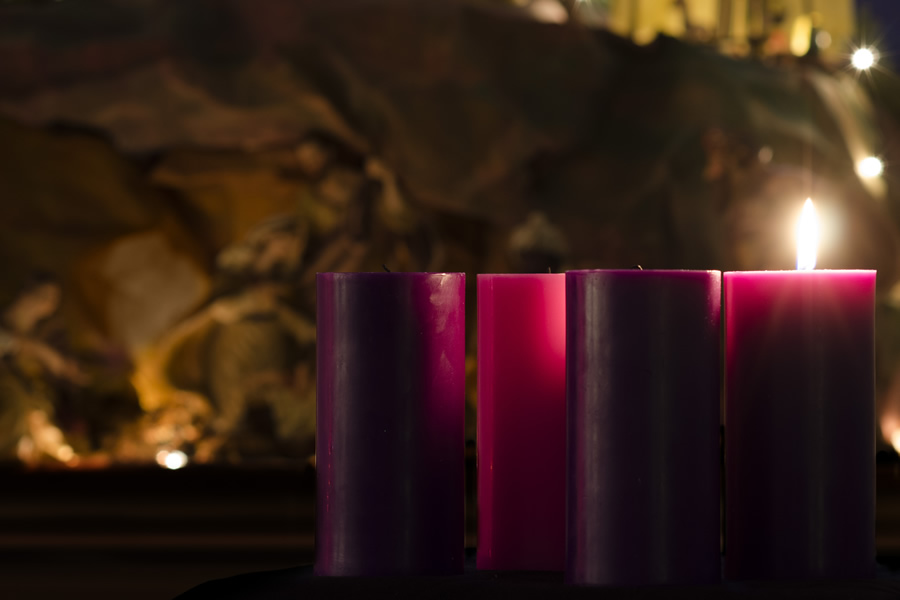
What is Advent?
12-02-2023Weekly ReflectionFr. Robert AliunziDear Friends,
The term Advent comes from two Latin words Ad-ventus or ad-venire, which simply means “to arrive” or “to come” respectively. It marks the beginning of the Church’s liturgical calendar. It is a four-week period leading up to Christmas.
For us Christians, and Catholics in particular, it means a time of expectation and preparation for the Lord’s birth. So, the prophecy of John the Baptist: “a voice of one calling in the desert, prepare a way for the Lord …” (Mk 1, 3), echoes loudly to us this season.
This weekend we officially begin our Advent Season with a clarion call to “Watch” and “Be awake” for we do not know the time or the hour when our Savior is coming. We also have to acknowledge that even though this Savior already came over two thousand years ago, He still continues coming to us in various forms such as through the poor and needy, through orphans and the sick, through the elderly and lonely. So, we have to always be watchful so as to be able to receive and welcome them and give them hope through our support to them. I will elaborate more on this in my next article.
This week however, our focus shifts particularly to waiting, expectant waiting which requires us to be watchful and awake. We all know how difficult this can be because we live in a world that is always fast and on the move. We can’t wait, except on Black Fridays! We love fast food, fast cars, fast internet, fast wealth and fast everything! We want it and we want it NOW! Yes, we live under the dictatorship of speed that abhors waiting!
Next weekend, the second Sunday of Advent, John the Baptist gives us clues to the type of environment that can help us overcome this mundane yearning for speed and movement. In order to foster this “Advential” waiting disposition, he goes to the desert, away from the fast world of his time in order to be alone with God and pray. It was in this desert that he was able to cultivate the necessary silence, simplicity of life and solitude that enabled him to discern the coming of the Savior. Going into the desert, therefore, was for John the first step of this waiting because it put him in an environment where God could easily reach him.
Similarly, in order for us to be able to wait this advent season, we need to cultivate our own desert environment like John the Baptist, away from the fast world of our time. We have to be alone with our God, slow down and pray more. First, to be able to pray effectively, a simple life is necessary because in our day-to-day life, we are routinely mesmerized and distracted by what appears to be pretty, precious, and enchanting but which are in the end very superficial. We have to get rid of these excessive baggage because they block us from seeing Christ whenever He comes and from seeing things as they are.
Secondly, we need silence; we need to be still in order to be able to pray. We need this today more than ever because we live under what Cardinal Robert Sarah calls the “dictatorship of noise”. Yes, we love noise and abhor silence, we love to talk and not listen. Just look at the number of earphones dangling on the ears of so many blasting away music or meaningless chatters! No offense intended! “Without silence that precedes it, speech runs the great risk of being useless chattering instead…”, says Cardinal Sarah. In environments like these, we cannot pray, we cannot wait, we cannot be healed of our constantly disturbed spirits. Friends, we need a place of quiet this season in order to be able to wait in complete silence and hear God come and speak to us.
Finally, we need solitude. We live in the fast world of multi-tasking. We love to drive and text at the same time even though often with catastrophic consequences because we are driven by the instinct to perform, to produce and do many things all at once. That’s us, that’s me, that’s you, dear friends! We cannot concentrate on one thing at a time because we fear solitude. Yet, we have to stand in solitude in order to discover who we are and who our God is. John the Baptist gives us the lenses to do this in today’s reflections. He gives the lenses to make sense of the “Advential Waiting”!
I love you.
BACK TO LIST